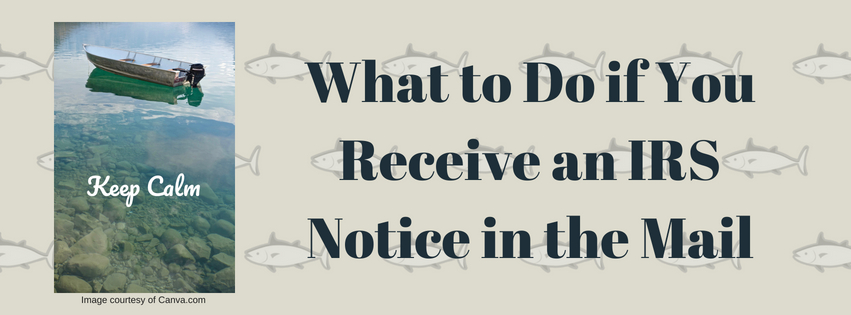Let’s be honest: it can be scary to receive a notice from the IRS in the mail – our minds often jumping straight to worst case scenario of racked up penalties, or wondering if it could be a scam…
Thankfully, unlike phone calls from those claiming to be IRS representatives, most mail notices are legitimate and usually not a reason to panic. Have you received an IRS notice recently? Here’s what to do.
1) Don’t Ignore It
As almost all letters from the IRS are notices about important changes or requests regarding your federal tax return or account, it’s important that you don’t ignore or throw them away. Often, simply reading the letter fully and following instructions will allow you to clear up any issue.
However, all notices received from the IRS should always be top priority, as not responding with the appropriate action in a timely manner can lead to added penalties.
2) Read the Letter Carefully
Before doing anything else, you should read the letter carefully.
Is it a notice for a corrected or changed tax return? If so, compare the information with your original filing to make sure it matches up before noting the changes in your personal records or alerting your tax professional.
Is it a notice for taxes due or the required payment of fees? Again, review the details to see if what’s listed coincides with your records, before following the instructions to submit the appropriate payment.
Check to make sure you didn’t accidentally post a payment to a different period. I’ve seen individuals handling their own payroll post into the wrong quarter leaving a balance due for one quarter and a credit in another. Simply writing a letter or calling to have the payments moved can clear up this mistake.
3) Only Reply if Necessary
Unless you dispute the contents of the notice or are instructed to respond within the letter, there’s usually no need to contact or reply to the IRS. If you do need to contact them, follow the instructions listed or use only the phone number located on the top right-hand corner of the letter.
If you wish to dispute the notice, write a letter to the IRS stating your reasoning why along with documents that give evidence for your claim, and address it to the office listed on the contact stub at the bottom of the notice. As the IRS typically responds within 30 days, don’t be concerned if you don’t hear back right away.
4) Be Wary of Scams
To help avoid scams, keep in mind that all initial contact from the IRS will be through a mail notice, and never via phone call, social media, or through a text message. This is not to say that the IRS doesn’t contact taxpayers over the phone at all, but all phone calls from the IRS happen only after a series a mail notices, and are usually scheduled at that.
That being said, no matter the form a notice takes, always doublecheck the data provided to confirm its legitimacy before giving away any personal or tax information. And if you’re ever unsure whether you owe tax money or not? You can always confirm your account balance with the IRS here.
If you are unsure if the notice is valid or not, contact your CPA for guidance, or reach out to the IRS to get your questions answered. Agents want to assist in resolving the issue and will be happy to discuss your situation to help you clear up the problem for which the notice was mailed.
